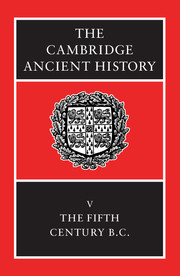Book contents
- Frontmatter
- Contents
- List of maps
- List of text-figures
- Preface
- 1 Sources, chronology, method
- 2 Greece after the Persian Wars
- 3 The Delian League to 449 b. c.
- 4 The Athenian revolution
- 5 Mainland Greece, 479–451 b. c.
- 6 The Thirty Years' Peace
- 7 Sicily, 478-431 b.c.
- 8 Greek culture, religion and society in the fifth century b.c.
- 9 The Archidamian War
- 10 The Peace of Nicias and the Sicilian Expedition
- 11 The Spartan Resurgence
- Chronological Notes
- Chronological Table
- BIBLIOGRAPHY
- Index
- 1 Greece and Western Asia Minor
- References
9 - The Archidamian War
Published online by Cambridge University Press: 28 March 2008
- Frontmatter
- Contents
- List of maps
- List of text-figures
- Preface
- 1 Sources, chronology, method
- 2 Greece after the Persian Wars
- 3 The Delian League to 449 b. c.
- 4 The Athenian revolution
- 5 Mainland Greece, 479–451 b. c.
- 6 The Thirty Years' Peace
- 7 Sicily, 478-431 b.c.
- 8 Greek culture, religion and society in the fifth century b.c.
- 9 The Archidamian War
- 10 The Peace of Nicias and the Sicilian Expedition
- 11 The Spartan Resurgence
- Chronological Notes
- Chronological Table
- BIBLIOGRAPHY
- Index
- 1 Greece and Western Asia Minor
- References
Summary
THE CAUSES OF THE WAR
It is not an unreasonable attitude to be interested in the Peloponnesian War for what Thucydides made of it and not for its own sake, and few episodes in history are so closely associated with their chronicler. This chapter cannot replace the reading of his history, and makes no attempt to provide a substitute. At best, it may be possible to give a narrative which clarifies some of his thinking and calls attention to points which he has obscured.
Open warfare between Athens and the Peloponnesian League began in 431. Thucydides oscillates between two beginnings of the war, the Theban attack on Plataea in the spring (II.1–7.1) and the Spartan invasion of Attica eighty days later (I.125.2, n. II.12.3, 19.1). The two are apparently conjoined at VII.18.2, and at V.20.1 Thucydides seems to treat the date of the former as the date of the latter. In an important passage (VII.18.2) the Spartans acknowledge that the Thebans should not have attacked Plataea in a time of peace and that they themselves should not have taken up arms while the Athenians were offering arbitration under the terms of the Thirty Years' Peace; Athenian ambassadors had warned them (1.78.4) not to outrage the gods by whom that peace had been sworn. It was thus agreed that Sparta had formally and illegally opened the continuous war, but matters were not as simple as that; as Polybius said (III.6.6), while abstaining from using this instance, one should not confuse the beginning (arche) of a war with its causes (aitiai).
- Type
- Chapter
- Information
- The Cambridge Ancient History , pp. 370 - 432Publisher: Cambridge University PressPrint publication year: 1992
References
- 4
- Cited by



